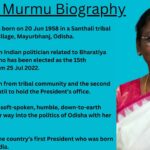
Sant Tukaram Maharaj introduction
Sant Tukaram Maharaj (1608 – 1650 CE) was a prominent 17th-century Indian saint and poet who is revered for his devotional poetry and teachings. He was born in Dehu, a small town near Pune in Maharashtra, India.
Tukaram Maharaj’s devotional compositions, called Abhangs, are considered a masterpiece of Marathi literature. He wrote around 5,000 abhangs in the Marathi language, expressing his devotion to Lord Vitthal (a form of Lord Vishnu) and his philosophy of the importance of self-realization, humility, and love towards all.
Tukaram Maharaj’s teachings emphasized the importance of living a simple and honest life and treating all living beings with respect and kindness. He believed in the power of devotion and surrender to the divine as the means to achieve spiritual enlightenment.
Tukaram Maharaj’s influence on Marathi literature and culture is immense, and he is widely regarded as one of the greatest saints and poets of Maharashtra. His life and teachings continue to inspire people of all ages and backgrounds, and his legacy is celebrated through various festivals and traditions in Maharashtra.
Brief Biography of Sant Tukaram Maharaj
| Name | Sant Tukaram Maharaj |
| Also Known as | Tukoba, Bhakta Tukaram, Tukaram Maharaj, & Tukaram Bolhoba Ambile |
| Nationality | Indian |
| Date of Birth | Born in 1608 CE |
| Birth Place | Village Dehu, City Pune, State of Maharashtra, India |
| Father’s Name | Bolhoba Ambile |
| Mother’s Name | Kanakai Ambile |
| Brother’s Name | Savaji and Kanhoba |
| Sister’s Name | Muktabai and Jijabai |
| Spouse Name | Rakhma Bai & Avalai Jija Bai |
| Children’s Name | Son – Santu, Mahadev, Vithal and Narayan and a daughter Bhagirathi |
| Religion | Hindu |
| Caste | Kunbi |
| Famous for | Abhangs which are considered a masterpiece of Marathi literature. |
Sant Tukaram Maharaj Family details
Sant Tukaram Maharaj was born in 1608 in the village of Dehu, near Pune, in the state of Maharashtra, India. He was born to Bolhoba and Kanakai, who were farmers by profession and members of the Kunbi caste.
Sant Tukaram’s life began with a series of hardships. He was initially married to Rakhma Bai, and they had a son named Santu. Unfortunately, both his wife and son fell victim to the devastating famine of 1630-32. This event had a profound impact on him, prompting him to withdraw from society and devote himself to spiritual reflection. During this period of deep introspection, Sant Tukaram found solace in the path of devotion to God. With time, he was able to gradually move beyond his grief and re-engage with the world. He later married Avalai Jija Bai and had four children, including three sons named Mahadev, Vitthal, and Narayan, as well as a daughter named Bhagirathi. This transformational experience helped him become an esteemed poet, saint, and spiritual leader, and his legacy continues to inspire people today.
Tukaram’s wife, Rakhumabai, was a devoted follower of his teachings and is said to have supported him in his spiritual pursuits. In one famous incident, when Tukaram was in the midst of a spiritual crisis and had resolved to fast until he received divine guidance, Rakhumabai brought him a piece of sugarcane to break his fast and encouraged him to persevere in his spiritual quest.
Tukaram’s family members, including his children and grandchildren, are said to have continued his legacy and spread his teachings after his death. Today, Tukaram’s descendants are known as Tukai or Tukoba and are respected members of the Maharashtrian community.
Sant Tukaram Maharaj Early Life details
Sant Tukaram Maharaj was born in 1608 CE in the village of Dehu, which is located near the city of Pune in Maharashtra, India. He was born into a family of farmers belonging to the Sudra (lower) caste. His parents were Bolhoba and Kanakai, and he had three siblings: a younger brother named Savaji and two sisters named Muktabai and Jijabai.
As a child, Tukaram was known for his pious nature and love for Lord Vitthal, a form of Lord Vishnu worshipped in Maharashtra. He was also interested in spiritual pursuits and would often spend time in meditation and prayer. Despite facing financial difficulties, Tukaram’s family members were supportive of his spiritual interests and encouraged him to pursue his passion for God.
In his early adulthood, Tukaram worked as a shopkeeper and continued his spiritual practices. However, he faced many personal tragedies during this period, including the death of his first wife and children. These experiences further deepened his faith and strengthened his devotion towards Lord Vitthal.
Eventually, Tukaram Maharaj gave up his business and devoted himself entirely to the service of Lord Vitthal and his devotees. He spent his days composing devotional poetry and singing the praises of the Lord.
Sant Tukaram Maharaj – Social Reforms
Sant Tukaram Maharaj was a 17th-century saint and poet from Maharashtra, India, who played a significant role in social and religious reform in his time. His teachings and actions aimed to promote social equality and harmony, and challenged the prevailing caste-based hierarchies and social injustices.
Here are some of the social reforms that Tukaram Maharaj promoted through his teachings and actions:
- Challenging caste-based discrimination: Tukaram spoke out against the caste-based discrimination that was prevalent in society at the time. He believed that all individuals were equal in the eyes of God and that one’s caste did not determine their worth or spiritual eligibility.
- Promoting education: Tukaram emphasized the importance of education and encouraged people, regardless of their caste, to seek knowledge and wisdom. He believed that education could help break down social barriers and promote equality.
- Empowering women: Tukaram advocated for the empowerment of women and believed that they should have the same rights and opportunities as men. He spoke out against the practice of child marriage and encouraged women to receive an education.
- Criticizing superstitions: Tukaram criticized the superstitions and blind faith that were prevalent in society at the time. He encouraged people to question traditional beliefs and practices and to use reason and logic in their spiritual pursuits.
- Promoting non-violence: Tukaram emphasized the importance of non-violence and advocated for peaceful coexistence among all individuals. He spoke out against violence and war and encouraged people to resolve conflicts through dialogue and understanding.
- Through his teachings and actions, Tukaram Maharaj promoted social reform and challenged the prevailing social norms and injustices of his time. His teachings continue to inspire people today and his legacy is celebrated as an important part of Maharashtra’s cultural and spiritual heritage.
Sant Tukaram Maharaj Famous Quotes
Sant Tukaram Maharaj’s teachings were mainly conveyed through his devotional poetry in the form of Abhangs, which contained many memorable and inspiring quotes. Below are some of a few of his famous quotes:
- “Do not expect anything from anyone. Expectations hurt, be self-sufficient.”
- “The remedy for all afflictions is the remembrance of God.”
- “One who has faith in God and devotion to Him is relieved from all sufferings and attains eternal peace.”
- “Realize that there is only one caste – the caste of humanity. And that there is only one religion – the religion of love.”
- “In this world, the only permanent thing is the name of God. Everything else is temporary and transient.”
- “Be humble, be simple, and bring peace to your mind. This is the way to happiness.”
- “One who understands the pain of others is the true knower of God.”
- “In the ocean of life, the grace of God is the boat that will take you across.”
These quotes reflect Tukaram Maharaj’s philosophy of devotion, humility, and love towards all living beings, and his teachings continue to inspire people to this day.
Sant Tukaram Maharaj Books
Sant Tukaram Maharaj wrote numerous devotional poems and compositions in the Marathi language, which are collectively known as “Abhangs.” Many of these Abhangs were compiled into various books and manuscripts. Here are some of the most well-known books that contain the poetry and teachings of Sant Tukaram:
Tukaram Gatha: This is a collection of all the Abhangs written by Sant Tukaram. It is considered one of the most important literary works in Marathi literature.
Tukaramachi Gatha: This is another collection of Tukaram’s Abhangs, compiled by a disciple named Mahipati.
Abhang Gatha: This is a collection of devotional poetry by several saints of Maharashtra, including Tukaram Maharaj.
Tukoba Bhaktalilamrut: This book contains the life stories and teachings of Tukaram Maharaj and his disciples.
Tukaramache Lokpriya Abhang: This book contains a selection of Tukaram’s most popular Abhangs.
These books are available in various editions and translations, and they continue to inspire and influence people of all backgrounds and faiths.
Movies made on the life of Sant Tukaram Maharaj
There have been several movies made on the life of Sant Tukaram Maharaj. Below are some of the most well-known ones:
Sant Tukaram (1936): This was one of the earliest movies made on the life of Tukaram Maharaj. This was directed by Vishnupant Govind Damle and Sheikh Fattelal.
Sant Tukaram (1965): This was a Hindi-language movie directed by R. V. Pandit and starred Balraj Sahni in the lead role.
Tukaram (2012): This Marathi-language movie was directed by Chandrakant Kulkarni and starred Jitendra Joshi in the lead role.
Gatha Tukaram (2015): This was a Marathi-language biographical movie directed by Praveen Tarde.
Sant Tukaram (2000): This Marathi-language movie was directed by Dr. Jabbar Patel and starred Dilip Prabhavalkar in the lead role.
These movies showcase the life and teachings of Sant Tukaram Maharaj and are a great way to learn more about his contributions to Marathi literature and culture.
Places associated with Sant Tukaram Maharaj
Sant Tukaram Maharaj is a revered saint and poet from Maharashtra, India, who is associated with many places that hold significance in his life and legacy. Here are some of the important places associated with Tukaram:
Dehu: Dehu is a small village near Pune, Maharashtra, where Tukaram was born and spent most of his life. The village is home to the Tukaram Gatha Mandir, a temple dedicated to Tukaram’s legacy, where his samadhi (memorial shrine) is located.
Pandharpur: Pandharpur is a town in the Solapur district of Maharashtra and is home to the Vitthal Rukmini Temple, a major pilgrimage site for Hindus. Tukaram made several pilgrimages to Pandharpur and composed many of his abhangs (devotional poems) in praise of Lord Vitthal.
Alandi: Alandi is a town in the Pune district of Maharashtra and is the site of the samadhi of Tukaram’s contemporary, Sant Dnyaneshwar Maharaj. Tukaram is said to have visited Alandi to pay his respects to Sant Dnyaneshwar and composed some of his abhangs there.
Shivaji Park, Mumbai: Shivaji Park is a public park in Mumbai that is associated with Tukaram because of the famous Tukaram Maharaj Vrindavan, a gathering of devotees that takes place every year to commemorate his life and teachings.
Srikshetra Narayanpur, Odisha: Srikshetra Narayanpur is a village in the Kendrapara district of Odisha that is associated with Tukaram because he is believed to have visited the village during his travels and composed some of his abhangs there.
These are just some of the important places associated with Sant Tukaram Maharaj, whose life and teachings continue to inspire people across Maharashtra and beyond.
FAQ
Q. What is Tukaram Maharaj full name?
A. Tukaram Bolhoba Ambile
Q. At what age Tukaram maharaj died?
A. At the age of 42 Years
Q. What is Tukaram Maharaj daughter name?
A. Bhagirathi
Q. What is Tukaram maharaj Mother name?
A. Kanakai Ambile






